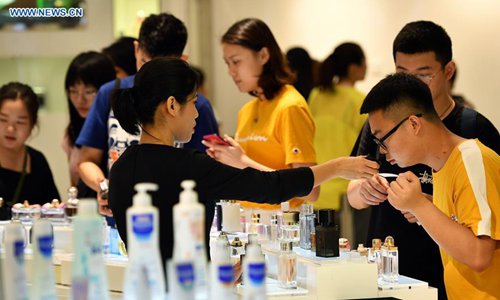Chinese consumers turn to duty free as outbound tourism halted
By Li Xuanmin Source: Global Times Published: 2020/7/8 19:53:40

People shop at a duty free shop in Haikou, capital of south China's Hainan Province, May 2, 2019. Photo:Xinhua
Chinese consumers have been embarking on a new shopping spree, but without the bother of having to fly overseas to buy luxury goods.
Instead, they are consuming in the domestic market and swarming into duty free shops to buy everything from smartphones to wine, as outbound travel has been shut down due to the coronavirus pandemic.
The new streak could open a market at about $40 billion, industry observers said. Amid the global coronavirus outbreak which has weighed down the prospect of foreign trade, it could also revive and lift domestic consumption to shore up China's virus-hit economy.
Shanghai-based retailing company Bailian Group announced on Wednesday that it has filed an application for a duty-free operating license. Although Bailian said in the statement that approval is subject to uncertainty, the company's shares soared by the daily limit of 10 percent to 23.97 yuan ($XX) per share at Wednesday's opening.
Another retail group, Wangfujing, also announced in June that it has been granted a duty-free license from China's Ministry of Finance. The company said Wednesday that it will open a subsidiary, with registered capital of 500 million yuan, to conduct duty free-related business.
The standard for duty-free consumption has also been lowered drastically in recent days. Zhongchufu, a duty-free department store in downtown Beijing, announced that Chinese travelers who went abroad from August 1, 2019 to June 1, 2020 are eligible to shop at the store before December 31, 2020.
Previously, only outbound Chinese tourists whose departures were within 180 days could shop at the store.
In late June, China's Ministry of Finance, along with other government departments, announced a new rule that expands the per capita quota for offshore duty-free shopping in South China's Hainan Province from the previous 30,000 yuan to 100,000 yuan a year. The categories of commodities allowed to be sold in duty-free stores have been raised to 45 from the previous 38 to include electronic products and perfumes.
A spokesperson for Sanya International Duty Free Shopping Complex, the largest duty free shop in Hainan, told the Global Times that duty-free commodities including electronic products and wine have been selling "quite well."
"There has been a rise in consumer traffic since late June, and we also launched a slew of marketing campaigns to drive sales," the spokesperson said, without disclosing the sales number to date.
On July 1, the sales volume of four duty free stores in Hainan hit 60 million yuan, according to news website jiemian.com.
Most Chinese consumers believe it is a "good deal" to buy duty-free products in China since the overseas tourism industry hangs in the air amid global pandemic outbreak.
A Shanghai-based white collar worker surnamed Zong, who went to Hainan for a vacation last week, spent more than 20,000 yuan on cosmetics and bags. Zong told the Global Times on Wednesday that the prices of skincare products at duty-free shops are about two-thirds of those sold at regular stores.
"I'd suppressed my desire to shop for too long. As traveling abroad is not realistic right now, I'll definitely find time to buy more duty-free products in the future," Zong said.
Eight Chinese enterprises have been granted a duty-free license so far, including Wangfujing and Zhongchufu, according to media reports.
Xu Xiaolei, the marketing manager of China's CYTS Tours Holding Co, estimated that duty-free shopping in China will take off in the second half as consumption revives and more policy dividends kick in.
"The overseas consumption in the US, Europe, Japan and South Korea will be spent instead in China," Xu said, noting that it could serve as new driver for China's economy.
Chinese tourists were estimated to have spent more than $110 billion in shopping overseas in 2019, according to data compiled by industry website winshang.com.
Posted in: INDUSTRIES